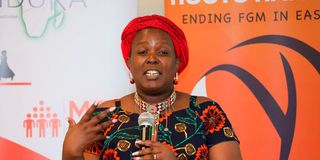FGM-free futures: How a letter is changing generations

Anti-FGM Board CEO Bernadette Loloju during the launch of a project, aimed at educating the Somali community on the negative impacts of FGM. She says involvement of elders in anti-FGM sensitisation has attributed to the decline of cases.
What you need to know:
- Mothers are required to write letters to their daughters about FGM, vowing to not allow them to be cut.
- The move stops the generational button that ensures the passage of FGM within families and communities.
The fight against female genital mutilation (FGM) has received a major boost following the launch of a new campaign.
The survivor-led campaign, #Dear Daughter, is being spearheaded by the Anti-FGM Board across the 22 FGM hotspot counties. It was launched during celebrations to mark International Day of the Girl on October 11, 2024. The campaign involves girls who have been saved from FGM. They have created their own movement called ‘Daughters against FGM’, denounce FGM and join community efforts to end the practice.
The campaign is aimed at ensuring survivor mothers end the outlawed practice in the communities through awareness forums, #FGMEndsWithUs! The mothers are required to write letters to their daughters about FGM, vowing to not allow them to be cut, a move that will see the passing of the generational button of ending FGM in families and communities.
Dear Daughter is the brainchild of the Anti-FGM Board to sensitise mothers to stop passing on the FGM trauma to their daughters. The campaign is a generational declaration by mothers to protect their daughters for a future free from the vice.
Anti-FGM Board CEO Bernadette Loloju said they are encouraging mothers who underwent the cut to write letters to their daughters and protect them from the harmful practice. The campaign also involves girls who have been saved from FGM creating their own movement called ‘Daughters against FGM’ to stand up for themselves and denounce the practice.
The letter reads: “Dear daughter, even though I went through FGM trauma, I will not let you go through the same…”
Bernadette said, “Mothers are better placed to protect their daughters than anybody else because we cannot place a police officer in every household, but a mother can be the best protection for her daughter.”
They are also communicating messages of FGM eradication through schools to create awareness, among those being forced by parents to undergo the practice, that they should seek assistance from the board, local police stations, the national administration, community advocates and rescue centres.
“We are also using a community approach where women themselves can use churches, and women’s groups in their communities to address the challenge. We want to have many women in the community where children facing the cut can run to for assistance,” she added.
Board chairperson Ipato Surum said the campaign will ensure mothers protect their girls, who will, in turn, become champions in the fight against the vice. Ipato, who vividly remembered the day she underwent mutilation, said it deprives girls of their health and dignity and would not wish any girl to go through the trauma. “Girls are not just passive recipients of collaborative efforts but are also architects of the future. When we listen to their stories, their aspirations, and their desires, we realize they have the solutions we seek,” she said.
According to the Kenya Demographic Health Survey (KDHS) 2022 prevalence ranking of FGM in Kenya by counties, Wajir leads with 97.2 per cent, Mandera 95.9 per cent, Marsabit 83 per cent, 82.5 per cent, Kisii 77.3 per cent, Samburu 75.6 per cent, Nyamira 74. 7 per cent, Isiolo 66 per cent, Tana River 60.1 per cent, and Narok 51 per cent while the least is Busia with 0.1 per cent.
A 2020 report by Unicef states that Kenya’s progress towards eradicating FGM is stronger than that of other nations in eastern or southern Africa. It states that more than four million girls and women in Kenya have undergone FGM.
Kenya outlawed FGM in 2011. Offences include aiding or abetting FGM, possessing mutilation tools, and failing to report a perpetrator. The law stipulates a prison sentence of not less than three years or a fine of Sh200,000 or both. A person who causes death through FGM can be sentenced to life imprisonment.
Besides Kenya, such a campaign has also been previously launched in Somalia, one of the countries with high FGM prevalence. The Mogadishu-based Ifrah Foundation launched the Dear Daughter campaign in Kismayo in December 2021. It was a joint initiative by UNFPA Somalia and the Ifrah Foundation.
The campaign is actively against any form of FGM in Somalia, targeting both policy-level stakeholders and practising communities. It seeks to increase knowledge of the long-term consequences of FGM and contribute to long-term behavioural change towards the practice, and advocates for zero tolerance for FGM at the government level.
According to the 2020 Somalia Health and Demographic Survey (SHDS), the country has one of the highest rates of FGM in the world. The SHDS indicates that 99 per cent of women aged between 15–49 have undergone FGM. In Somalia, Dear Daughter is the brainchild of Ifrah Ahmed, a social activist and FGM survivor.





